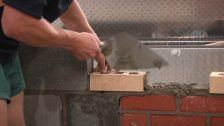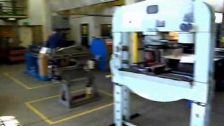Getting Floored
What skills do I need to be successful in flooring? A sharp eye for designs, patterns, colours, be able to read drawings, to be in a tip-top physical condition and be able to estimate spaces and do quick mathematical equations. The flooring industry is forever in demand for skilled and abled workers, particularly young, committed, reliable apprentices.
The Flooring Industry Training Initiative (FITI) promotes the flooring industry and serves as a mediator between the industry and future employees. Employers come to FITI when they need apprentices and FITI puts out an advertisement (typically on the internet) for that company and addresses what qualities a successful apprentice must have etc. Apprentices apply and Bill Tree (FITI coordinator and teacher at Lidcombe TAFE in Floor Covering and Finishing) has an interview with the aspiring apprentice and if they are successful, he introduces the potential worker to that company. Because they have these interviews beforehand, and Bill gives recommendations based on that, companies are far more likely to employ a successful apprentice.
FITI has so far won 2 awards: The 2007 Victorian Training Initiative of the Year award, from the Government, and The Australian Institute of Training and Development National Award for Learning and Development Excellence, awarded by Industry.
Bill Tree is a former floorer and now the coordinator for FITI in NSW and a teacher at Lincoln TAFE in Floor Carving and Finishing (Certificate II and III) of carpet, timber and resilient (like vinyl, cork). All the apprentices he mentors at the moment are male.
Chris Lowe, owner Lomac flooring, started working with Bill 7 years ago. Together they talk through what the text for the advertisement should be and Bill then puts it out. Since FITI started, Chris says he has seen a raise in the apprentices that apply. It takes an apprentice 4 years to become a licensed floorer.











